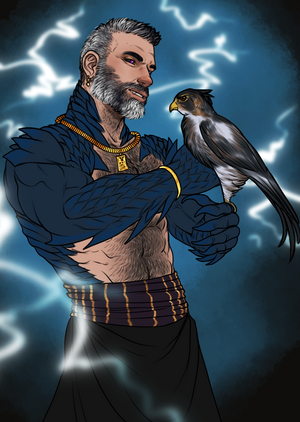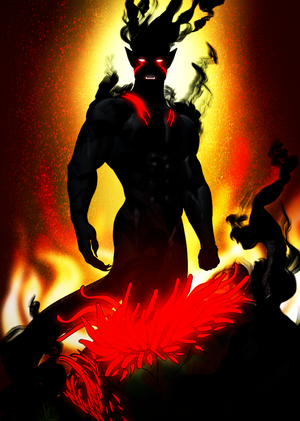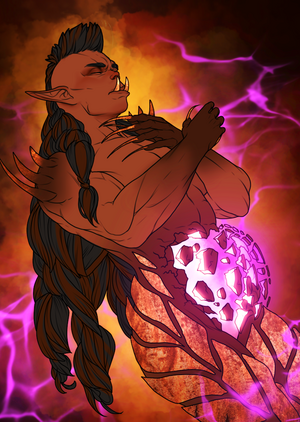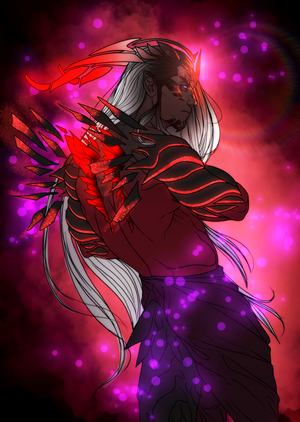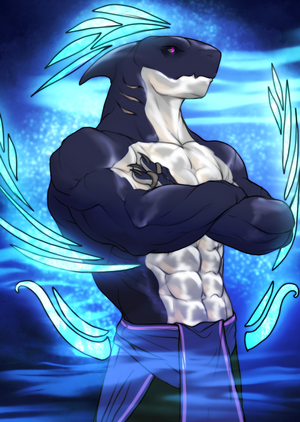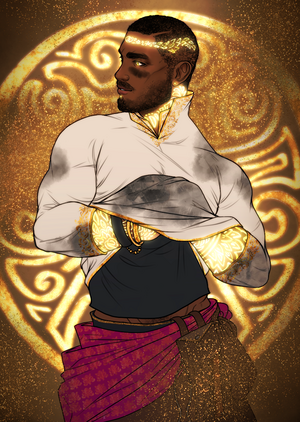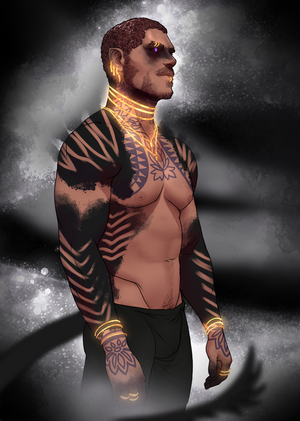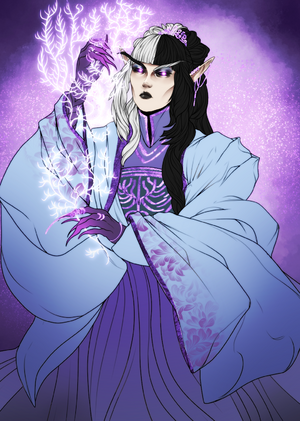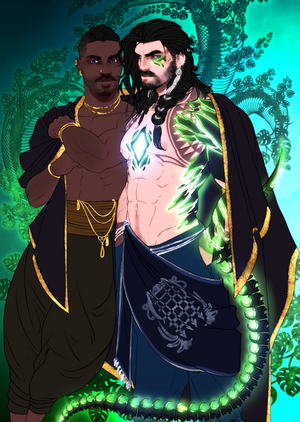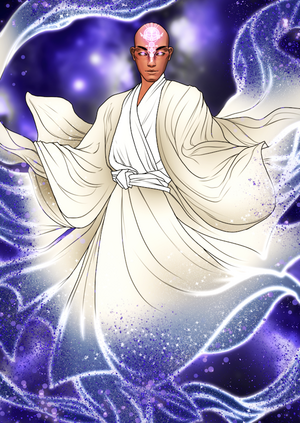More actions
| Line 300: | Line 300: | ||
The [[Draconism Expanded]] Page contains information on Draconism Holy days (one each month), as well as basic rituals performed by Draconism Priests for the faithful. This Page is useful to read for upcoming festivals, but is not necessary to fully explore unless an event is actually upcoming and pinned to the calendar. The bottom of the page contains information relevant to Draconism Priests. | The [[Draconism Expanded]] Page contains information on Draconism Holy days (one each month), as well as basic rituals performed by Draconism Priests for the faithful. This Page is useful to read for upcoming festivals, but is not necessary to fully explore unless an event is actually upcoming and pinned to the calendar. The bottom of the page contains information relevant to Draconism Priests. | ||
===The Advancement=== | ===The Advancement=== | ||
The Advancement as an event began with the death of Caius. Caius had been suffering from the Void Infection for | The Advancement as an event began with the death of Caius. Caius had been suffering from the Void Infection for 100,000 years, and his eventual demise was guaranteed and even foreseen. For all this time, it was Umbra who ordained that the only way to solve Caius's condition, was to remove all Magical things form the world, so that the connection between the Void and Aloria could be severed. Indeed, historical events implied that this was correct, because after each Void Invasion, Caius's condition would improve for some time as most Magic was seeped from the world, only for it to return as Mages became more prevalent. There is some healthy room for discussion to determine whether Umbra was right, whether he was wrong, or whether he obfuscated the truth on purpose. This theory would not imply that Umbra is specifically malicious or treasonous to the Draconic cause, but that he might have stretched the truth to keep the Draconic cause busy with the wrong type of cure, to guarantee Caius's death just to see what would happen if he did die, which would be consistent with his death-god obsession with the beauty of death. | ||
Whatever the motivations or circumstances, the event of Caius's death and Cinerius's rebirth from his corpse was cause enough to call for a full conclave. With the beginning of the conclave, it became pretty evident that Regulus was not satisfied with a partial conclave, and so he called down Orion, something that had not been done for thousands of years. Following this, the conclave was convinced to rescind the punishment of Nox. It had become pretty clear in the past few millennia that being punished was part of Nox's plan all along, and that being trapped in the mirror dimension as he was, that he was difficult to keep tabs on by the other Dragons. His habit to be secretive and have plots detached from the common Draconic cause was considered a liability, and perhaps in part, Nox was proved right by the endless cycles of free-will causing the same outcome one way or another. Indeed, the very reversal of the Denial of Immortality was reason enough to claim that the rhetoric used by Nox to create the Slizzar was at least in part right. | Whatever the motivations or circumstances, the event of Caius's death and Cinerius's rebirth from his corpse was cause enough to call for a full conclave. With the beginning of the conclave, it became pretty evident that Regulus was not satisfied with a partial conclave, and so he called down Orion, something that had not been done for thousands of years. Following this, the conclave was convinced to rescind the punishment of Nox. It had become pretty clear in the past few millennia that being punished was part of Nox's plan all along, and that being trapped in the mirror dimension as he was, that he was difficult to keep tabs on by the other Dragons. His habit to be secretive and have plots detached from the common Draconic cause was considered a liability, and perhaps in part, Nox was proved right by the endless cycles of free-will causing the same outcome one way or another. Indeed, the very reversal of the Denial of Immortality was reason enough to claim that the rhetoric used by Nox to create the Slizzar was at least in part right. | ||
With all the Dragons re-convened, the conclusion was made that the impassioned guidance of the Dragons was in part to blame for the chaotic existence of their followers, and that their unclear and mysterious attitude to the sequence of history in the world, also had a part to play in the repeating cycles of destruction. As such, Regulus decreed that all Dragons should contribute to formulating a dogma, and that the Radicals that had come about because of his chaotic return to power, should all be dismissed. Despite these lofty and ambitious intentions, the conclave wasn't a complete success. The Dragons still could not decide on a common policy towards the Infection, even if they chose a more benign term calling it the Presence instead. While the intention had been to unify all Dragons under one policy, Regulus's mediated middle ground wasn't radical enough for either the pro, or anti-Magic side, and so the conclave was split three ways, which all things considered was an improvement over a 12-way split. | With all the Dragons re-convened, the conclusion was made that the impassioned guidance of the Dragons was in part to blame for the chaotic existence of their followers, and that their unclear and mysterious attitude to the sequence of history in the world, also had a part to play in the repeating cycles of destruction. As such, Regulus decreed that all Dragons should contribute to formulating a dogma, and that the Radicals that had come about because of his chaotic return to power, should all be dismissed. Despite these lofty and ambitious intentions, the conclave wasn't a complete success. The Dragons still could not decide on a common policy towards the Infection, even if they chose a more benign term calling it the Presence instead. While the intention had been to unify all Dragons under one policy, Regulus's mediated middle ground wasn't radical enough for either the pro, or anti-Magic side, and so the conclave was split three ways, which all things considered was an improvement over a 12-way split. | ||
===The Immortal War=== | ===The Immortal War=== | ||
The Immortal War is a long period of war between the Dragons and notably the Arken, but more generally speaking all Void/Exist (and later Ordial) forces which were considered alien and hostile to the world of Aloria. It is called the Immortal War, because the war was effectively never-ending. Arken and Dragons were immortal, they could not kill each other, only harm and destroy the things each of them created, and so the war was essentially a perpetual griefing contest to see who could destroy as much as possible of the other side. The Immortal War lasted almost 8,000 years. Historically the number 7,000 years is used, which anchors it to the destruction of the Seraph civilization, but this is a miscalculation, because the Seraph did not immediately perish when the first Void Invasion began, but 1,000 years afterwards. The Immmortal War ended when the Denial of Immortality was decreed several centuries before Cataclysm, but slowly implemented. The Dragons had forseen the end of the last Void Invasion, and the Cataclysm, and had foreseen that a necessary action in this sequence of events, was their own demise. As a result, the Dragons wove a powerful Dragon Magic spell, that removed the concept of immortality from the laws of reality, thus making all immortal things in Aloria subject to the same entrophy as Umbra had ordained to mortals. Arken were previously immortal, because Dragons were immortal, but as Dragons were now mortal, so were Arken. Everyone started dying, and thus the Immortal War ended. | The Immortal War is a long period of war between the Dragons and notably the Arken, but more generally speaking all Void/Exist (and later Ordial) forces which were considered alien and hostile to the world of Aloria. It is called the Immortal War, because the war was effectively never-ending. Arken and Dragons were immortal, they could not kill each other, only harm and destroy the things each of them created, and so the war was essentially a perpetual griefing contest to see who could destroy as much as possible of the other side. The Immortal War lasted almost 8,000 years. Historically the number 7,000 years is used, which anchors it to the destruction of the Seraph civilization, but this is a miscalculation, because the Seraph did not immediately perish when the first Void Invasion began, but 1,000 years afterwards. The Immmortal War ended when the Denial of Immortality was decreed several centuries before Cataclysm, but slowly implemented. The Dragons had forseen the end of the last Void Invasion, and the Cataclysm, and had foreseen that a necessary action in this sequence of events, was their own demise. As a result, the Dragons wove a powerful Dragon Magic spell, that removed the concept of immortality from the laws of reality, thus making all immortal things in Aloria subject to the same entrophy as Umbra had ordained to mortals. Arken were previously immortal, because Dragons were immortal, but as Dragons were now mortal, so were Arken. Everyone started dying, and thus the Immortal War ended. | ||
Revision as of 21:31, 2 June 2024
| Draconism | |
|---|---|
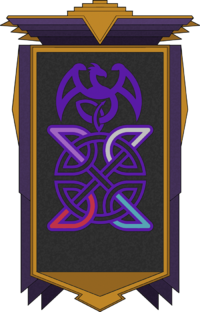 | |
| Religion | |
| Pronunciation | Dra-konism |
| Origins | Unknown, presumed over 70.000 years ago |
| Deities | |
| Regulus, Caius, Daiana, Triton, Nox, Marik, Severena, Aurora. | |
Origins
Draconism as a Religion has unclear origins, as it may actually be the oldest Religion in the world, but has never continually been the same. There is archeological evidence to suggest that every civilization that existed in a particular cycle had some kind of representation in Draconism, but that the dogma was radically different each era. Even the current form of Draconism has not remained consistent, as recent changes caused by the death of one of their kind, caused a complete revision of the Religion itself. Historically Draconism was the only Religion without an afterlife and without a clear dogma declared by the Gods. While for example Fornoss Gods specifically taught the faithful how to live their lives and religious law, Dragons never did this, leaving their worshipers to grasp at speculations what the dogma should be. Modern Draconism however, finds much more guidance from the Dragons, which is sometimes why The Advancement is considered a break from the past. Old Draconism is referred to as just that, while modern Draconism is sometimes called Advanced Draconism to differentiate it from the past.
Core Beliefs
At its simplest, Draconism is a religion that holds the Dragons as Gods, creators of the world, and all living things in it. Most religions acknowledge the existence of Dragons and their mechanical control over creation, but Draconism is the only Religion that focuses on the Draconic personas as divine paragons of virtue (and vice). Historically, Draconism was less of a Religion and more of a cult in which mortals projected certain values on the Dragons, that they loosely acknowledged but never fully invested in. Draconism was always a fairly light religion, as the Gods never reinforced religious Dogma, until The Advancement.
The Advancement
The Advancement is an event that occurred in 312 AC, when the Dragons committed to fulfill the functions of Gods for Draconism, rather than tacitly condoning its existence with occasional affirmation. The event that precipitated The Advancement was the death and rebirth of Caius, who after suffering 100,000 years from a consuming Void-sickness, finally died, and was reborn as Cinerius. With an impending religious schism in the already fracturing Draconic faith, the Dragon Regulus led a conclave of Dragons in which they agreed on new policies and dictates and created the Draconism afterlife while passing the will of the Gods down to all believers.
The Dragon Conclave
At a baseline, all Draconists should be inspired and live by the example of the virtues of their Gods. However, the Draconism Gods are divided over 3 distinct Pantheons of 4 Dragons each. Each Draconism worshiper chooses to belong to one of these Pantheons, and adopts their ideology on The Presence. The Presence is a new term used by the Dragons to refer to what they previously called The Infection, all things Magical and not of Aloria's reality. During The Advancement, the Dragons effectively abandoned full extermination of extraplanar Magic, but they still have different views on how to interact with things not of the world of Aloria. Individual virtues can be found on the God descriptions, the Pantheons are explained below. Note, there is a minor exception to all the below. Any Ordial-Aligned Person/Spirit that is somehow tied to the Malefica, Machinist, or Consigner, cannot be tolerated even by the Successors. Those Persons/Spirits must either be cleansed to be interacted with, or removed from Aloria and the living.
- The Consolidation is the Pantheon of the Dragon Gods Regulus, Triton, Marik, and Gaia. The Consolidation represents the desire to create space for The Presence, but with compromises.
- To resolve Spirits: The Consolidation supports Nature Binding of Spirits, but also insists on cleansing their Extraplanar Magic, or converting it to God Magic (Draconic Magic)
- To resolve Mages: The Consolidation supports the inclusion of Mages, but insists that under no circumstance Sinistral Magic is used, and those who do are Anathema.
- To resolve Afflicted: The Consolidation continues the fight against the Afflicted, believing them to have no place in the world of Aloria due to their nature.
- The Annexation is the Pantheon of the Dragon Gods Severena, Aurora, Nox, and Orion. The Annexation represents the desire to create space for The Presence, but only on their terms.
- To resolve Spirits: The Annexation supports Shard Binding of Spirits, which in turn shuts off all their Magic making them Mundane, an in essence Bound Automata.
- To resolve Mages: The Consolidation tolerates Mages, but insists on declaring Sinistral users Anathema, and also insist Magic usage is kept to an absolute minimum with no frivolous entertainment uses.
- To resolve Afflicted: The Annexation continues the fight against the Afflicted, believing them to have no place in the world of Aloria due to their nature.
- The Succession is the Pantheon of the Dragon Gods Cinerius, Umbra, Felicula, and Daiana. The Succession represents the desire to include The Presence in the fold with as few rules as possible.
- To resolve Spirits: The Succession supports Nature Binding of Spirits, and makes no further changes. Their only requirement is that Spirits accept real feelings and a consciousness.
- To resolve Mages: The Succession supports the inclusion of Mages with no requirement other than that they use Sinistral Magic only in desperation or need, and rely on Dragons to fix the damage to the world.
- To resolve Afflicted: The Succession supports fighting the Afflicted where they embody the sins of Draconism, but otherwise proposes compassion and forgiveness to cursed mortals.
Vices and Virtues
While the Gods and Goddesses section contains more information about the specific Vices and Virtues, it's quite a lot of dense information. For this reason, this sub-header will quickly discuss these aspects of the Gods. It is important to remember that creation is flawed due to the inherent flaws of free will, and that the Dragons do not expect a vice-free life from the faithful. Rather, vices are actions that are meant to be exposed by fellow-faithful so that everyone can work towards improving these flaws and removing from from someone. Awareness and the removing of vice in mortals, is a communal responsibility. How far virtues contribute to the afterlife, is discussed further below.
- Regulus is the God-King, who promotes the virtue of preserving life but respecting natural causes. The vice he preaches against is idleness and inactive centrism that leads to non-reaction to trouble.
- Cinerius is the Love-God, who promotes the virtues of loving and feeling unconditionally and with no restraint. The vice he preaches against is being ambitionless or having no lust for life and experience.
- Daiana is the Planet-God, who promotes the virtues of respect for the lives of others, and environmentalism. The vices she preaches against are slavery, abuse of loved ones, and corruption of nature.
- Triton is the War-God, who promotes the virtues of physical or mental strength and training, and acquisition of power. The vice he warns against is apathy and inaction to serve under incompetent leaders.
- Nox is the Scholar-God, who promotes the virtues of learning and protecting Draconic sites or information from misuse. The vice he warns against is to be caught unaware, uninformed, or unprepared.
- Marik is the Tech-God, who promotes the virtues of kindness, compassion, and charity to others in act and thought. The vice he warns against is the meaningless destruction of the work of others.
- Umbra is the Death-God, who promotes the virtue of respecting the cycle of life and death and supporting it with grace. The vice he warns against is to covet the powers and prerogatives of Dragons and Gods.
- Felicula is the Magic-God, who promotes the virtue of extolling happiness and good feelings in others, and creativity. The vice she warns against is contempt or cynicism to the mysteries and beauty of the world.
- Severena is the Protector-God, who promotes the virtue of responsibility taking, and protecting the world from harm. The vices she warns against are impatience, indecision, and acting without thought.
- Aurora is the Creation-God, who promotes the virtues of diligence, equality, and freedom with equal opportunity. The vices she loathes are cruelty, sadism, injustice and callousness, as well as the whole concept of hatred.
- Gaia is the Nature-God who promotes the virtues of preserving balance, and to show bravery in the face of certain defeat. The vices he warns against are overconfidence, and refusing to accept or seek help.
- Orion is the Star-God warden of the afterlife, who promotes the virtues of temperance and asceticism. The vice he warns against, is the inherent smugness that is common among Draconists towards non-believers.
Old Believers
Draconism has a variety of smaller regional Cults called Old Believers. The Old Believers hold onto the Draconism Radicals as they were before The Advancement. Choosing to play an Old Believer is not recommended, because it cuts a Character off from the other Draconism worshipers. Even though Old Believers are not strictly heretics, they might be excluded from social activities or Pantheon-related quests. Old Believer information is preserved specifically for Character who felt betrayed by The Advancement, or sensed a sinister intention in the actions of Umbra, and want to continue Caius's Burning Extermination.
Gods and Goddesses
Draconism has a total of 12 Gods, split equally over 3 Pantheons. Unlike Fornoss where it is possible to worship only one specific Pantheon, Draconists must worship all Gods of all Pantheons equally. They may however choose one specific Dragon God(dess) who they particularly feel represented by or connected with, and that will be their Patron God(dess). Conflict between Draconists generally speaking only exists on ideological lines with how to deal with Spirits/Mages/Afflicted, but this conflict should never be so deep as to fracture the believers. There is general permission for the faithful to disregard/refuse assistance/ridicule/denigrate if something happens that violates their Pantheon's Ideology, but they should never attack, exclude, or sabotage other Draconism worshipers outright.
Regulus, the Blue King Dragon
Cinerius, the Red Passion Dragon
Daiana, the Gray Dreaming Dragon
Triton, the Black Chain Dragon
Nox, the Teal Unseen Dragon
Marik, the Brown Etherforge Dragon
Umbra, the White Twilight Dragon
Felicula, the Yellow Harmony Dragon
Severena, the Green Stalwart Dragon
Aurora, the Purple Creation Dragon
Gaia, the Indigo Nature Dragon
Orion, the Ivory Cosmos Dragon
Priesthood
Priesthood for Draconism is more complicated than one might assume at first glance from a Religion that was effectively dead for 300-odd years while most Dragons were either in slumber, or in a near-death state. At the end of the Immortal War, the Dragons decreed that the Mantle of Creation (the theoretical stewardship over the world's functions) was to pass to mortals, and that they too would become mortal (explanation on why they did this is further below). As this occurred around Cataclysm, Draconism as a Religion was effectively dead for 300 years except for among the Sihai where the Dragons could still be visited, or the Isldar who were deceived. Still, when the Dragons returned centuries later, they found that much of the priesthood had survived their absence, and that in some places, the faith had even grown. The Religion had always been considered more of a curiosity by the Dragons, who never asked to be worshiped, or set out to have a Religion specifically ordained by them. They fully expected everyone to give up on the Religion when they left, but the fact they had not, caused a change to occur.
The structures that were still very much in place, were the hierarchy set out before the Immortal War that had more or less survived. At the head of all the priesthood were the Matrons (a non-gendered term) that applied to the single most favored of each Dragon God. Each God had their own Matron, a mortal who would have their favor, and know most personally their wishes and ambitions for the world, and could translate them to the other faithful. This position was often elective, but some Matrons passed their lineage from generation to generation, which became especially common after the Denial of Immortality. The only Matron succession that had not survived, was Regulus's Matron, who was eventually chosen from the Isldar to be Gwenyth Zylmoira, leading the faithful into a new era.
Below the Matrons, are the Dragon Priests. Dragon Priests represent the whole religion, but usually specialize in the teachings of a specific Dragon God as their patron, and emphasize their qualities and teachings above the others. Generally speaking though, Dragon Priests should be aware of all other Dragons just as much, and be able to hold their own in theological discussion on the merits and values of the other Dragons too, but also understand the overarching narrative of Draconism as a whole. It is possible to be a Dragon Priest and hold other occupations, as Dragon Priesthood is more of a personal choice than an ordained position. There is no official academy or place of teaching for Priests, the only real requirement is that each self-ordained priest takes a pilgrimage to the Matron of their Patron God, and seeks approval from them.
Below the Dragon Priests are the Dragon Champions. Unlike Dragon Priests, Dragon Champions do not widely act as priests, they are more akin to lay-priests but hold an extreme emphasis on specific Dragon Gods. Anyone can be a Dragon Champion, it is in most cases self-declared, but 9 out of 10 Dragon Champions are warriors because they enforce the might and will of their Dragon usually by the sword. This may lead to some comical arrangements, with Felicula Dragon Champions forcing participants to have a party and be happy, with the threat of physical harm if they do not. Dragon Champions can administer religious services, but only specifically to their own patron God, while Dragon Priests can perform more general and wide-spread religious services.
Expanded Lore
The Expanded Lore section contains additional contextual information about the Draconist faith. This section is not necessary to read to get a good understanding of the lore, just the background information.
Festivals and Worship
The Draconism Expanded Page contains information on Draconism Holy days (one each month), as well as basic rituals performed by Draconism Priests for the faithful. This Page is useful to read for upcoming festivals, but is not necessary to fully explore unless an event is actually upcoming and pinned to the calendar. The bottom of the page contains information relevant to Draconism Priests.
The Advancement
The Advancement as an event began with the death of Caius. Caius had been suffering from the Void Infection for 100,000 years, and his eventual demise was guaranteed and even foreseen. For all this time, it was Umbra who ordained that the only way to solve Caius's condition, was to remove all Magical things form the world, so that the connection between the Void and Aloria could be severed. Indeed, historical events implied that this was correct, because after each Void Invasion, Caius's condition would improve for some time as most Magic was seeped from the world, only for it to return as Mages became more prevalent. There is some healthy room for discussion to determine whether Umbra was right, whether he was wrong, or whether he obfuscated the truth on purpose. This theory would not imply that Umbra is specifically malicious or treasonous to the Draconic cause, but that he might have stretched the truth to keep the Draconic cause busy with the wrong type of cure, to guarantee Caius's death just to see what would happen if he did die, which would be consistent with his death-god obsession with the beauty of death.
Whatever the motivations or circumstances, the event of Caius's death and Cinerius's rebirth from his corpse was cause enough to call for a full conclave. With the beginning of the conclave, it became pretty evident that Regulus was not satisfied with a partial conclave, and so he called down Orion, something that had not been done for thousands of years. Following this, the conclave was convinced to rescind the punishment of Nox. It had become pretty clear in the past few millennia that being punished was part of Nox's plan all along, and that being trapped in the mirror dimension as he was, that he was difficult to keep tabs on by the other Dragons. His habit to be secretive and have plots detached from the common Draconic cause was considered a liability, and perhaps in part, Nox was proved right by the endless cycles of free-will causing the same outcome one way or another. Indeed, the very reversal of the Denial of Immortality was reason enough to claim that the rhetoric used by Nox to create the Slizzar was at least in part right.
With all the Dragons re-convened, the conclusion was made that the impassioned guidance of the Dragons was in part to blame for the chaotic existence of their followers, and that their unclear and mysterious attitude to the sequence of history in the world, also had a part to play in the repeating cycles of destruction. As such, Regulus decreed that all Dragons should contribute to formulating a dogma, and that the Radicals that had come about because of his chaotic return to power, should all be dismissed. Despite these lofty and ambitious intentions, the conclave wasn't a complete success. The Dragons still could not decide on a common policy towards the Infection, even if they chose a more benign term calling it the Presence instead. While the intention had been to unify all Dragons under one policy, Regulus's mediated middle ground wasn't radical enough for either the pro, or anti-Magic side, and so the conclave was split three ways, which all things considered was an improvement over a 12-way split.
The Immortal War
The Immortal War is a long period of war between the Dragons and notably the Arken, but more generally speaking all Void/Exist (and later Ordial) forces which were considered alien and hostile to the world of Aloria. It is called the Immortal War, because the war was effectively never-ending. Arken and Dragons were immortal, they could not kill each other, only harm and destroy the things each of them created, and so the war was essentially a perpetual griefing contest to see who could destroy as much as possible of the other side. The Immortal War lasted almost 8,000 years. Historically the number 7,000 years is used, which anchors it to the destruction of the Seraph civilization, but this is a miscalculation, because the Seraph did not immediately perish when the first Void Invasion began, but 1,000 years afterwards. The Immmortal War ended when the Denial of Immortality was decreed several centuries before Cataclysm, but slowly implemented. The Dragons had forseen the end of the last Void Invasion, and the Cataclysm, and had foreseen that a necessary action in this sequence of events, was their own demise. As a result, the Dragons wove a powerful Dragon Magic spell, that removed the concept of immortality from the laws of reality, thus making all immortal things in Aloria subject to the same entrophy as Umbra had ordained to mortals. Arken were previously immortal, because Dragons were immortal, but as Dragons were now mortal, so were Arken. Everyone started dying, and thus the Immortal War ended.
Despite the Immortal War ending however, the Denial of Immortality was not permanent, or so it appeared. There were Dragons who dissented from this final decision, most notably Severena and the Green Dragons, who opted to enter a death-like sleep instead, and Renita, one of Regulus's Dragon-kin who objected. Through subterfuge and Dragon-Magic, Renita survived the Denial of Immortality, and continued to work to convince the successive Dragonsoul reincarnations that their decision was a bad one. She failed for 300 years, with each successive reincarnation into a mortal body having less and less alignment with the Draconic cause, all the way up to the point that they seemed to have completely forgotten they were Dragons at all. When, around 307 AC, Renita finally made headway, and convinced the new host of Regulus that the Denial of Immortality should be undone. Caught between a mortal reality of the Regalian Empire that was facing calamity after calamity, and his immortal Dragon god-hood, Regulus was convinced to undo the Denial of Immortality. When all the Dragons were revived and came together at the Conclave that would eventually herald The Advancement, the spell that removed immortality from the fabric of reality was undone, and things could once again be immortal, thus completing the return of the Dragons.
Draconism Afterlife
The Draconism Afterlife is exceptionally new, and also is not. Since forever, the world's cycle of rebirth was fueled by the Soul Rivers, an invisible force of flowing soul essence that spanned the whole world. When a person would die, their soul would pass into the Soul Rivers where Gods would usually fetch their faithful and lift them up to their respective afterlives. In a way, the Soul Rivers could be considered the waiting room for the afterlife, but for Draconists, it effectively was the afterlife. To Draconists, their souls would move into the Soul River, and then eventually disintegrate into nothingness, with each memory, emotion, or thought, forming a seedling to create a new soul, whether in an animal, plant, or person. This for some people imparted an immense sense of nihilism in their work, which was also the reason why the Dragons ordained to actually make an Afterlife.
The Draconism Afterlife is very similar to Unionism, in that it grants the soul of the faithful the means to regard reality and see the world as Orion does, without any promises of paradise or endless pleasures in an afterlife realm. Orion's promise to the faithful is that instead of letting their souls perish in the Soul Rivers, he will lift their souls up to the heavens, and create a star to represent their essence in the night sky. Instead of just moving forward with Draconists dying after The Advancement, Orion has committed to reaching into the Soul Rivers and time displacement from Regulus's Time Magic, to attribute the billions of stars already in the night sky to the faithful who have passed on before.
For Draconism, there is no requirement to be let into the afterlife. Even immoral and bad people who commit many sins are permitted into the afterlife so long as they believe genuinely and capably (for example, if they are Nature Bound Spirits) in the Dragons as Gods and were committed to the cause of Draconism at some point in their life. The only difference that marks virtuous versus sinful people, is that sinful people are faint and dim distant stars, while virtuous people who served the Dragons faithfully and achieved much of their work and intentions, become a bright focal point in the night sky. The faithful can sense their loved ones or passed-on friends in the night sky, and can even peer at specific stars to feel a sense of closeness to those who were lost to time or war.
Trivia
- Draconism is technically the oldest religion, but due to constant changes in its dogma, it is now actually the youngest Religion, being exactly 1 month old at time of this article writing.
- There are not just 12 Dragons, there are theoretically hundreds. Regulus for example has 6 other Blue Dragons supporting him, and they are named, but not mentioned on this page due to them being largely unnecessary information. Dragons should be considered a form of an advanced civilization that has acquired godhood, but that inevitably, there are very limited numbers of them. The Gods just happen to be the leaders of the "Clade".
| ||||||||||
| Accreditation | |||||
|---|---|---|---|---|---|
|
| ||||
